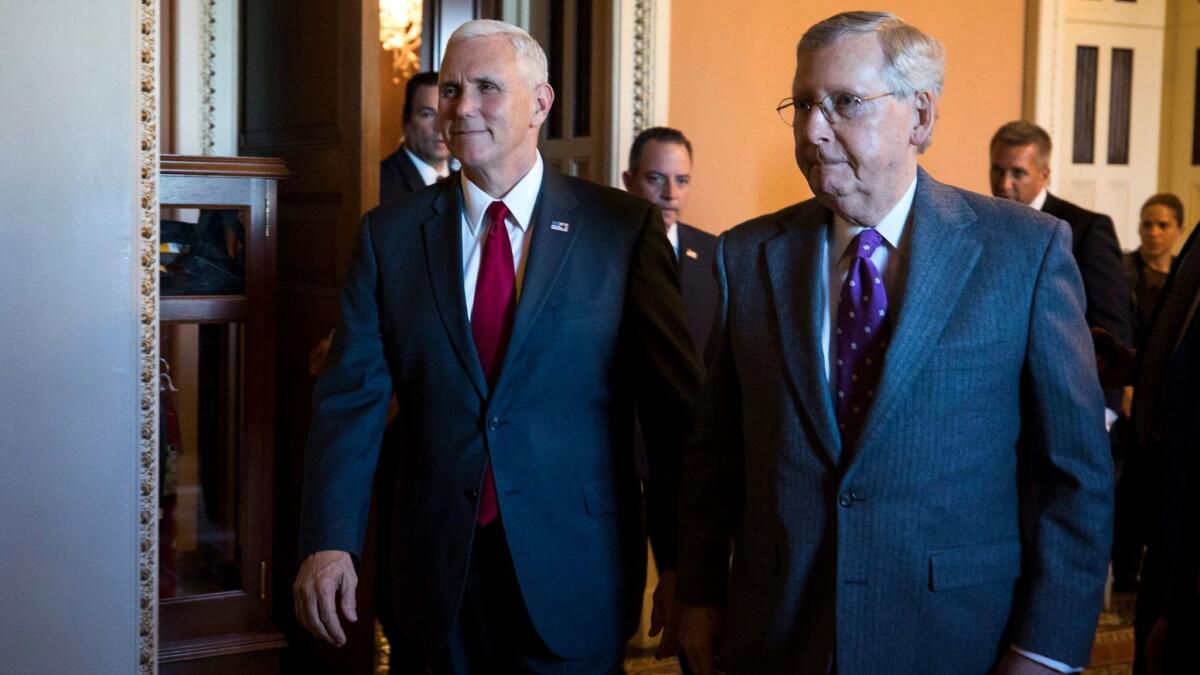Editorial: Obamacare repeal: A bad goal that’s proving hard to achieve

Now that Republicans really can repeal much of the 2010 Affordable Care Act, they’re coming to grips with the problems such a drastic move would create. It was so much simpler when “repeal Obamacare” was just a slogan, back when congressional Republicans could count on a filibuster by Senate Democrats or a veto by President Obama to stop them from succeeding. With President-elect Donald Trump waiting to sign a repeal bill once he takes office, the consequences are real and the stakes exponentially higher.
GOP leaders had planned to rush a bill through Congress this month much like the one they passed early in 2016, repealing the subsidies, taxes and insurance mandates in the law but delaying the effective date until after the next election to give them time to develop an alternative. (The 2016 bill died a fully predictable death when it was vetoed by Obama.) But a growing number of medical professionals, scholars and policy wonks are warning Republicans that this repeal-delay-replace strategy would violently disrupt the market for individual insurance policies, with millions of people potentially losing their coverage during the transition period.
They’re right about that. Repealing the law is bad enough, but doing so without an alternative that could preserve coverage for the estimated 20 million Americans who gained it through Obamacare would be reckless and irresponsible.
And that’s just one problem. Here’s another: Some Republicans are now questioning whether it’s wise to revoke all the tax increases in the Affordable Care Act, which offset some of the cost of the healthcare subsidies for lower-income and elderly Americans. In fact, there are at least two compelling reasons to leave those tax hikes in place.
The first is that if Republicans really don’t want to cause millions of people to lose their insurance coverage, they will need to provide either premium subsidies or, for those living near the poverty line, the coverage itself — just as the ACA does. And that’s expensive. It costs the feds about $100 billion a year to extend Medicaid to single adults and families with incomes up to 138% of the federal poverty line, as 31 states have done through the ACA. And Washington spends about $140 billion a year on premium subsidies for those with incomes up to 400% of the poverty line. The existing ACA taxes provide much of that revenue.
Granted, the coverage proposals floated by Republicans in the past have carried lower price tags because they’re not built around comprehensive insurance policies, unlike the ACA. Instead, their subsidies would help offset the cost of more modest plans that offer no help for people with costly or rare conditions. Under the GOP vision, people who need more extensive coverage because of pre-existing conditions or health risks would likely wind up in federally subsidized state “high-risk pools.” Numerous states had high-risk pools before the ACA, and their premiums were exceptionally high and rising unsustainably because they typically covered only those with expensive chronic ailments.
Nevertheless, even the Republicans’ more penurious subsidies would cost many billions of dollars. And as appealing as it might be to the GOP to eliminate the nearly two dozen tax increases in the ACA, it would be a lot easier to preserve some of them than to repeal them all and then impose new tax hikes later.
A second argument against repealing the tax hikes is that it’s bad politics. The two biggest of the ACA taxes are also the most progressive, because they apply only to individuals earning more than $200,000 per year or couples earning more than $250,000. One is a 3.8-percentage-point surtax on dividends, interest and other unearned income, the other a 0.9-percentage-point increase in the payroll tax that helps fund Medicare.
Eliminating the payroll tax increase would immediately push Medicare’s hospital fund back toward the insolvency that was looming before the ACA became law. And repealing the surtax would smack of sacrificing insurance coverage for lower-income Americans in order to cut taxes for the rich. Are those really the messages the GOP wants to send about its values? Rather than stampeding ahead with a reckless and inhumane plan to help wealthy Americans at the expense of the sick and the poor, Republicans should focus instead on ways to make Obamacare work better.
Follow the Opinion section on Twitter @latimesopinion and Facebook
More to Read
A cure for the common opinion
Get thought-provoking perspectives with our weekly newsletter.
You may occasionally receive promotional content from the Los Angeles Times.










